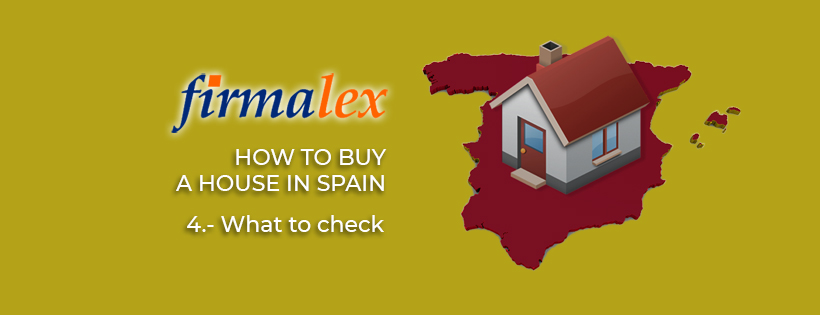This article is part of our guide How to buy a house in Spain which you will find in our Real Estate Consulting section.
In this article we explain the basic things to consider in order to avoid problems when buying a house in Spain.
Once you have found a property you like, it is best to visit it in person to make sure it meets your needs and expectations.
During an initial viewing, you may notice some obvious problems that can affect your decision to buy or negotiate the price. Some other problems may not be so easy to spot, which is why we recommend looking more closely at the condition of the property.
Before doing this, it’s good to do some basic checks. Here are some things to look out for, depending on the case.
Buying a plot of land to build a new property in Spain
Spain has long been popular with foreign buyers looking for holiday properties. The large number of inexperienced foreign buyers has occasionally given unscrupulous developers and estate agents the opportunity to sell properties that are not legal.
In some cases, building permits were not obtained before construction and the properties were eventually demolished by the local government. In other cases, the quality of the property did not meet specifications, resulting in costly repairs.
Many foreigners have had such experiences, which warn buyers abroad to be careful and not take unnecessary risks. We recommend checking at least the following:
- The references of the lawyers or real estate agents involved.
- The land registry (Registro de la Propriedad).
- The existence of an appropriate building permit.
- The property must not be in debt.
- Whether the property is structurally sound (either an expert or an architect can do this).
Most of this information can be provided by the Land Registry and requested by email, phone, fax or in person. You can find the relevant land registry office on the national website: www.registradores.org (in Spanish only).
As a non-resident, you can also buy a plot of land and have a property built yourself. In this case, good legal advice is even more important, as you need to make sure that the contracts with the builders are appropriate and watertight.
Buying a new house in Spain
The worst property scams in Spain, as elsewhere, involve unfinished or unbuilt properties. Although malicious intent is rare, caution is advised when buying a property that does not yet exist. At the very least, you should:
- Check whether the business exists and whether the project is registered in the land register.
- Check whether a building permit has been issued by enquiring at the local town hall.
- Do not sign a contract that you do not understand.
- Hire an independent party to translate it.
- Ask for proof that any money paid (e.g. a deposit) is properly held or spent.
- Get proof that you will get your money back if the property is not built.
Buying a second-hand property
Before you start buying, make sure you have seen:
- The cadastral value of the property and the amount of land transfer tax. The tax is levied based on the value of the property as determined by the municipality and not on the selling price. You can check this on the website of the regional tax authority using the cadastral number.
- A paid receipt for the previous owner’s annual property tax (IBI). It is also advisable to obtain a certificate from the town hall stating that there are no unpaid taxes from previous years.
- The cadastral certificate with the exact boundaries and square metres of your land – this is linked to the land register entry by a cadastral number. Make sure that the property and land description match in both entries.
- The initial occupancy permit or housing certificate issued by the town hall. You will need this document to connect to the electricity and water utilities. The developers cannot force you to build without this permit.
- A receipt showing that the previous owner paid all utility bills.
- If applicable, a certificate signed by the president of the community of owners (Comunidad de Vecinos) stating that there are no outstanding debts. You should know that as the new owner, you will assume the debts for the current and previous year (2 years in total) if you later discover that such debts are outstanding.
- Since 1 June 2013, all properties for sale or rent in Spain are required by law to have an energy efficiency certificate. If you are considering buying a property, the seller is obliged to provide you with this certificate.
Although this is not obligatory, in this case it is advisable to commission an expert to check a second-hand property.
Arranging a survey
It is possible to buy a property in Spain without doing a home inspection, but this is not advisable. With a home inspection, you can make sure that the property does not have any major defects that could be your downfall later.
There are generally two types of appraisals for existing properties. An appraisal is a superficial report that gives you an independent guide to the market value of the property.
A building survey goes deeper, examining the structural condition of the property and highlighting any serious problems. Building appraisals are more expensive than value appraisals, but also provide a more comprehensive overview of the condition of the property.
Solve your doubts
✅ Our staff speaks perfectly Spanish, Valencian, English and German with what will be able to communicate with us in your own language and thus clearly resolve your queries.
📍 Denia – Plaza del Convento, 6 – Mezzanine floor door B
📍 Valencia – Calle Creu Roja, 1 – Block 6, Floor 1, door 10 (* only by appointment)
✉📞 Contact: info@firmalex.com – Tel. +34 966 421 416 – Whatsapp +34 622 497 615



